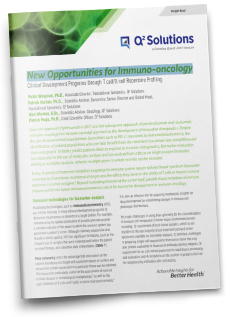
New Opportunities for Immuno-oncology
Clinical development programs through T cell/B cell repertoire profiling
Since the approval of ipilimumab in 2011 and the subsequent approvals of pembrolizumab and nivolumab, immuno-oncology has become a pivotal approach in the development of innovative therapeutics. Despite the use of conventional tissue/protein biomarkers such as PD-L1 measured by immunohistochemistry, the identification of patient populations who can best benefit from the treatment has proven less straightforward than anticipated. To better predict patients likely to respond to immuno-therapeutics, biomarker evaluation has expanded to the use of molecular analysis and has evolved from a focus on single analyte biomarker testing to multiplex analysis, wherein multiple genes to whole exomes can be assessed.
Today, a variety of treatment modalities targeting the immune system require tailored broad-spectrum biomarker screening to characterize mutational changes and the effects they have on the ability of T cells to mount immune responses to tumor antigens. Beyond evaluating features of the tumor itself, parallel characterization of immune features within the tumor microenvironment is critical for biomarker development in immuno-oncology.
Authors:
Victor Weigman, Ph.D., Associate Director, Translational Genomics, Q2 Solutions
Patrick Hurban, Ph.D., Scientific Advisor, Genomics; Senior Director and Global Head, Translational Genomics, Q2 Solutions
Alan Wookey, B.Sc., Scientific Advisor, Oncology, Q2 Solutions
Patrice Hugo, Ph.D., Chief Scientific Officer, Q2 Solutions
Complete the form below to access this insight brief








